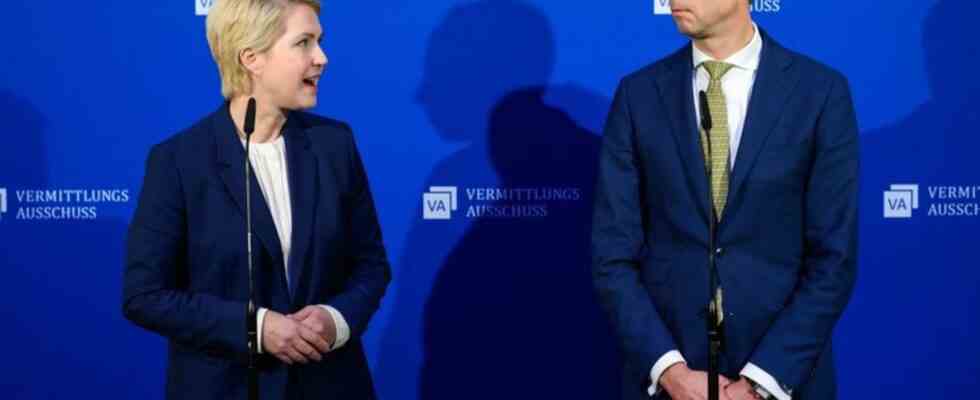social
Mediation committee seals citizens’ income compromise
Manuela Schwesig (SPD), Prime Minister of Mecklenburg-Western Pomerania, and Hendrik Hoppenstedt (CDU), the chairmen of the committee, speak after the negotiations of the mediation committee of the Bundestag and Bundesrat about the planned citizens’ allowance in the German Bundesrat. photo
© Bernd von Jutrczenka/dpa
Citizens’ income is on the home stretch: the mediation committee approves the compromise in just an hour and a half. Now the draft law has to go through the Bundestag and Bundesrat again. Start is on January 1st.
Millions of people in need can hope for higher government benefits and more thorough support from the job centers in the new year. After the basic agreement between the traffic light coalition and the CDU/CSU opposition, the Mediation Committee of the Bundestag and Bundesrat voted in Berlin on Wednesday evening for the planned citizens’ allowance in its amended version. Minister of Labor Hubertus Heil (SPD) emphasized after the 90-minute consultation: “Today it is clear: Citizens’ income will come on January 1 – Hartz IV will go.”
The Minister of Labor spoke of the largest social reform in two decades. “This isn’t a new name, we’re talking about a new system.” On the other hand, the Left MP Gesine Lötzsch said: “Hartz IV has been renamed.” Inadequate reform had been made worse by pressure from the Union. Like the AfD, Die Linke voted against the draft in committee. The compromise still has to be confirmed by the Bundestag and Bundesrat this Friday. This is considered safe.
Citizens’ income is to start at the beginning of the year with significantly higher standard rates in basic security. Significant parts of the reform are not to come into force until July 1: The job centers are to draw up a cooperation plan with each and every unemployed person concerned, in which the planned path back to regular work is determined.
Cooperation at eye level
SPD parliamentary group leader Katja Mast said: “The core of citizen money is cooperation on an equal footing.” FDP Vice Johannes Vogel also spoke of “good news” because performance will be more worthwhile for those affected in the future thanks to more generous rules on additional income. “That is the core of this reform for a more modern and fairer basic security.” Green party leader Britta Haßelmann explained that the citizen’s income is also in the interests of business and trade, which are often desperately looking for workers.
The CDU labor market expert Hermann Gröhe also spoke of a “good placement result”. “It was important for us to restore the balance between promoting and challenging.” This was successful. The CDU/CSU parliamentary group in the Bundestag backed the compromise in a special session with only one abstention. Group leader Friedrich Merz (CDU) expressed the expectation that on Friday in the Bundesrat all countries governed or co-governed by the Union would agree. It was initially unclear how the CSU-led Bavaria will behave. CSU regional group leader Alexander Dobrindt said: “The genie that went in the direction of an unconditional basic income is back in the bottle.”
The Union had prevailed over the traffic light coalition of SPD, Greens and FDP that job centers can sanction those affected in the event of breaches of duty more severely and earlier than originally planned with cuts in benefits. In addition, benefit recipients should only be allowed to keep 40,000 euros of their own assets. Originally, 60,000 euros had been planned.
Scholz defends reform against earlier criticism of the Union
Chancellor Olaf Scholz (SPD) had already said in the morning in the general debate in the Bundestag: “We will ensure that work is worth more than at any time in a CDU-led federal government.” Scholz defended the reform against previous criticism from the Union. What distinguishes the federal government and the CDU and CSU is “apparently the image that we have of the citizens of our country”. CDU and CSU had criticized some regulations as too mild and feared abuse.
In the current crisis, many people are not only worried about high energy and food prices, but above all about their jobs and the future of their business, said the Chancellor. “That shows one thing very clearly: the citizens want to work and they want to be able to make a decent living from their work.” The mediation committee had been called because the Bundesrat, unlike the Bundestag before it, had not approved Heil’s draft.
Berlin’s Governing Mayor Franziska Giffey (SPD) emphasized that “people who – for whatever reason – no longer participate in working life are now getting future prospects and real opportunities to get back into work”. Hesse’s Prime Minister Boris Rhein (CDU) said: “The compromise is impressive. I consider the result to be a great success for federalism.” Baden-Württemberg’s Prime Minister Winfried Kretschmann (Greens) said: “I’m glad that we found an amicable solution today and that both sides have moved towards each other.”

